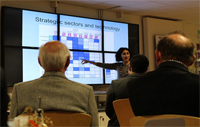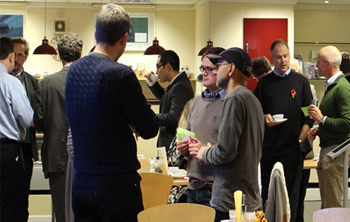Research Outputs
Projects with Birmingham Business School involvement
Professor John Fender (Department of Economics) gave the keynote address at the Association of Corporate Treasurers Midlands conference on 25th November 2014.
SmartCulture in the West Midlands: Malvern Business Breakfast (11 November)
 On Tuesday 11th November Dr Lisa De Propris (Birmingham Business School) as Scientific Co-Ordinator of the EU funded SmartCulture project together with the SmartCulture team, Dr Tamara West (Research Fellow) and Anthony Hughes (Project Manager), hosted a business breakfast at the Wyche Innovation Centre in the Malvern Hills to showcase the project and to explore further the technology, heritage and tourism cluster in the area.
On Tuesday 11th November Dr Lisa De Propris (Birmingham Business School) as Scientific Co-Ordinator of the EU funded SmartCulture project together with the SmartCulture team, Dr Tamara West (Research Fellow) and Anthony Hughes (Project Manager), hosted a business breakfast at the Wyche Innovation Centre in the Malvern Hills to showcase the project and to explore further the technology, heritage and tourism cluster in the area.
The SmartCulture project is undertaking research into and development of regional business clusters and collaborative networking across West Midlands ICT businesses, creative industries, and the cultural heritage sector. The project’s aim is to explore what benefits digital technology can bring to cultural and creative industries as well as the cultural heritage sector. SmartCulture will also promote cross sector and Europe wide opportunities and make recommendations for future investment in this region. More details about the project, which involves 13 European partners and their respective networks, can be found at www.smartculture.eu.
 The Wyche Innovation Centre is an innovative space providing office rental, a hotdesk area, a Malvern Hills Visitor Information centre and a co-operative run visitor Café . It also serves as a meeting space for, amongst other groups, the CyberSecurity cluster and the Technology for Tourism initiative. From the perspective of SmartCulture, TechTourism was of great interest, as it brings together local small businesses (ICT, creative, and tourism sector), local government, and local cultural heritage organisations. It also serves as a test bed for tourism tech projects.
The Wyche Innovation Centre is an innovative space providing office rental, a hotdesk area, a Malvern Hills Visitor Information centre and a co-operative run visitor Café . It also serves as a meeting space for, amongst other groups, the CyberSecurity cluster and the Technology for Tourism initiative. From the perspective of SmartCulture, TechTourism was of great interest, as it brings together local small businesses (ICT, creative, and tourism sector), local government, and local cultural heritage organisations. It also serves as a test bed for tourism tech projects.
The Business Breakfast event was well attended by local businesses, representatives from the education sector, local government and local LEPs, and not for profit organisations. After a presentation to showcase the SmartCulture project, attendees were invited to contribute through informal discussions and activities. The team also held a focus group immediately afterwards in which seven participants, drawn from across the sectors represented, discussed the benefits of locating businesses and projects in Malvern, and also highlighted areas which were in need of strengthening. The event and information gathered provided an initial insight into some key projects and case studies relevant to the SmartCulture project, and also enabled the exploration of beneficial existing and potential contexts for regional business, technology and heritage clustering.
Research Cluster news
The GVC Research Cluster is part of the winning EPSRC bid on “Building sustainable local nexuses of food, energy and water: from smart engineering to shared prosperity (The Local Nexus Network)"led by the University of Oxford.
- See GVC website for more information
Dr. Ferran Vendrell (Birmingham Business School) was involved in the organisation of the III International Conference on Business Servitization (ICBS), Bilbao 13th - 14th November 2014.
- See GVC website for more information
Publications
- Find publications from previous news articles
Journal articles (alphabetical order)
LATEST:
Bensassi, S., Martínez-Zarzoso, I., Suárez, C. (2014) The effect of maritime transport costs on the extensive and intensive margins: Evidence from the Europe-Asia trade. Maritime Economics and Logistics, vol. 16, issue 3, p. 276-297.
This article investigates the determinants of maritime trade. It focuses in particular on the extent to which variations in trade-related costs between Asia and Europe help to explain the surge in Euro–Asian trade in eight of the most emblematic categories of products related to Asian success: textiles, footwear, confection, machinery, electronic products, vehicles, furniture and pharmaceutical products. In marked contrast to other studies that focus only on the determinants of total maritime trade, we decompose trade into two margins: the number of different products exchanged (extensive margin) and the average value of each product (intensive margin). We estimate a trade-augmented gravity model with trade cost factors for specific trade flows and industries and for both margins of trade. Several types of trade costs are considered, namely maritime transport costs, time to export/import, behind-the-border trade costs and distances. The main findings indicate that lower freight costs increase aggregate trade values mainly by increasing the average value of imported varieties, but also by increasing the number of products traded. Our findings suggest that political actions aimed at spurring competition and innovation in the maritime transport industry do have an impact on the volume and composition of international trade.
Bensassi, S. et al (2015) Relationship between logistics infrastructure and trade: Evidence from Spanish regional exports. Transportation Research Part A. 72. pp47-61; DOI 10.1016/j.tra.2014.11.007.
Geographical factors and transport infrastructure are two of the key determinants that influence international competitiveness. In this sense, the quality of such infrastructure and how widespread it is, the distribution and capacity of logistics facilities in a country, as well as the number of private operators and their degree of specialisation, all play an increasingly important role in the design of business strategies aimed at increasing a country’s share of the international market. Until recently, however, availability and access to logistics services have been considered secondary factors when defining business competitiveness. This paper estimates an augmented gravity model of trade that specifically includes logistics and transport infrastructure indicators as explanatory variables. The model is estimated by using bilateral exports from 19 Spanish regions to 64 destinations (45 countries and 19 Spanish regions) with data for the period 2003 to 2007. The findings show that logistics is indeed important for the analysis of trade flows in goods and they highlight the importance of logistics measures at the regional level. In particular, the number, size and quality of logistics facilities positively influence export flows.
Siebert, S et al (2015) Target COPD: a pragmatic randomised controlled trial of targeted case finding for COPD versus routine practice in primary care: protocol. Biomed Central, London vol. 10. doi:10.1186/1471-2466-14-157. ISSN 1471-2466 (Online).
An example of multidisciplinary effort (BBS and the medical school), examining the work behaviour of people with COPD (chronic obstructive pulmonary disorder) – the study is tracking around 1000 patients from Birmingham and midlands GP practices over 5 years (2013-8).
As many sufferers work, too hard perhaps (“presenteeism” rather than absenteeism is one focus of the study), this study looks at the links between COPD, work, and worker happiness.
FORTHCOMING:
Whittle JN, Binner JM, Simm, WA and Busayawan A., Interacting with Computers, April 2015.
Organizations increasingly rely on digital tools, such as social media, to harvest public opinion on a variety of issues ranging from brand reputations to political debates. One area in which digital tools have great potential is in consultation on the design of public spaces. Public organizations are expected to consult with users of a public space before, during and after occupancy. Digital consultation tools could increase the effectiveness of this consultation process because: (a) they are available 24 hours a day and so do not rely on the physical presence of market researchers; and (b) data can be collected and analyzed using automated methods, thus allowing faster decision-making.
Despite these potential advantages, little is understood about how digital and non-digital consultations compare in practice. This paper reports on a live trial with a prototype digital consultation tool called VoiceYourView, which was co-designed with stakeholders and used to canvas opinion on the refurbishment of a major metropolitan library building. Over the course of six weeks, we used a variety of methods to collect comment from 600 users public comments; 600 users voiced their opinion on the redesign. We investigate how VoiceYourView comments differ from non-digital comments, whether the unprompted nature of VoiceYourView is sufficient, and what are the effects on users of the public summaries.
Our findings indicate that VoiceYourView encouraged more positive feedback than non-digital methods. We also find that positive comments in general contain less actionable information than negative comments, and unprompted comments have similar actionable content to prompted comments. We suggest that this pattern in soliciting more (traditionally difficult to obtain) positive comments with VoiceYourView versus traditional survey methods implies that digital consultation tools of this type can complement existing channels.
Busayawan A, Whittle JN, Binner JM and Lawlor Wright, T, Better service design for greater civic engagement, in The Design Journal, 2015.
Generally, people have a good understanding of their local areas. Hence, encouraging them to share this tacit knowledge with local authorities, urban designers and city planners could help improve the quality of public space design significantly. However, persuading people to share their concerns/ideas about their areas, especially through a digital platform, presents a real challenge. One of the main barriers is a lack of trust in the public feedback system. Thus, this research investigates relationships between online trust and service design in order to provide a guideline on how to design the feedback system that addresses users’ practical and emotional requirements. A mixed-methods approach was employed to identify key factors affecting online trust and their implications on service design. Six key factors affecting online trust were identified and combined to form a basis for service design guidelines. The outcomes show that service design can support all components required to build trust.
Books / book chapters:
LATEST:
Carmichael, F. and Thomas, D. 2014. Team performance: Production and efficiency in football, in Goddard, J. and Sloane, P. (Eds) Handbook on the economics of professional football, Cheltenham: Edward Elgar.
Forthcoming events
26 February, 16.30 - 18.00, Muirhead Tower 112
Professor John Child will speak on "Corporate influence on institutional development in an emerging economy: The case of China". John is Professor of Commerce at the University of Birmingham Business School, and Visiting Professor at Sun Yat-sen University, China.
5 March, 16.30 - 18.00, Muirhead Tower 112
Professor Royston Greenwood will speak on "Succeeding to failure: Hybrid organizations and institutional complexity", taking the case of a hospital that tried to reconcile public, private and professional logics. Royston is Professor of Strategic Management at the University of Alberta, Canada, and visiting professor at the Saïd Business School at the University of Oxford.
- Find out more about these events